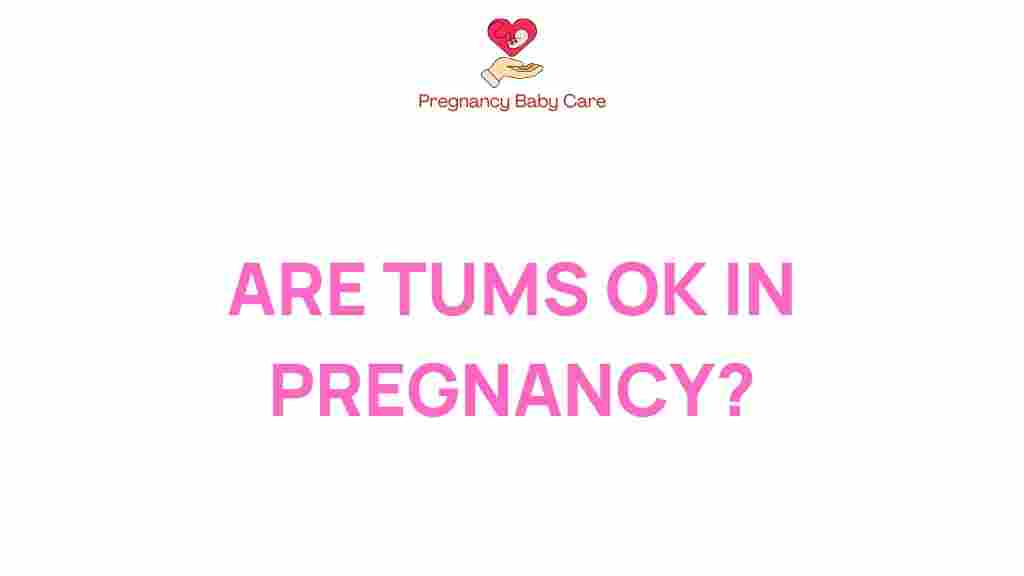Are Tums Safe During Pregnancy? What You Need to Know
Pregnancy is a beautiful journey, but it often comes with its set of challenges. One common issue that many expectant mothers face is heartburn. As your body undergoes hormonal changes and your growing baby pushes against your stomach, the discomfort of indigestion can become quite frequent. In this article, we will explore the safety of using Tums during pregnancy, focusing on pregnancy safety, antacids, and heartburn relief.
Understanding Tums and Their Role in Heartburn Relief
Tums are over-the-counter antacids made primarily from calcium carbonate. They are popularly used to relieve heartburn, acid indigestion, and upset stomach. For many, Tums can provide quick relief from the burning sensation caused by stomach acid. However, expectant mothers often wonder about the safety of using Tums during pregnancy.
Pregnancy Safety and Antacids
When it comes to pregnancy safety, it is crucial to be cautious about the medications you take, including antacids like Tums. Here are some important points to consider:
- Active Ingredients: Tums contain calcium carbonate, which is generally considered safe during pregnancy. In fact, calcium is an essential nutrient for pregnant women and helps in the development of the baby’s bones and teeth.
- Dosage: While Tums are safe, it is important to adhere to the recommended dosage. Pregnant women should not exceed the maximum daily limit, as excessive calcium intake can lead to health risks.
- Consultation with Healthcare Providers: Always consult with your healthcare provider before taking any medication, including antacids like Tums. They can provide personalized advice based on your health history.
Potential Health Risks
While Tums are generally safe, there are some potential health risks to be aware of:
- Hypercalcemia: Excessive intake of calcium can lead to hypercalcemia, a condition caused by high levels of calcium in the blood. Symptoms can include nausea, vomiting, and confusion.
- Kidney Stones: For some individuals, high calcium levels can contribute to kidney stone formation. This risk may be heightened during pregnancy.
- Digestive Health: Overuse of antacids can sometimes lead to digestive issues, including constipation or diarrhea.
How to Use Tums Safely During Pregnancy
If you’re considering using Tums for heartburn relief during pregnancy, follow these steps to ensure safety:
- Consult Your Doctor: Before starting any medication, including Tums, discuss your symptoms with your healthcare provider. They can confirm whether Tums are appropriate for you.
- Read the Label: Check the dosage instructions on the Tums packaging. Typically, pregnant women can take one to two tablets as needed, but do not exceed the recommended dose.
- Monitor Symptoms: Keep track of your heartburn symptoms and how often you need to take Tums. If you find yourself relying on them frequently, it may be time to discuss alternative solutions with your doctor.
- Consider Dietary Changes: Sometimes, dietary adjustments can help alleviate heartburn. Avoid triggers like spicy foods, caffeine, and large meals.
- Stay Hydrated: Drink plenty of water throughout the day to help with digestion and reduce heartburn.
Alternative Heartburn Relief Options for Expectant Mothers
If Tums are not the right choice for you, there are several other options for heartburn relief during pregnancy:
- Other Antacids: Some antacids like Maalox or Mylanta may also be safe during pregnancy. Always check with your doctor.
- Proton Pump Inhibitors: Medications such as omeprazole may be prescribed by your doctor if antacids are ineffective.
- Natural Remedies: Some women find relief through natural remedies such as ginger tea or chewing gum after meals.
- Elevating the Head During Sleep: Sleeping with your head elevated can help prevent nighttime heartburn.
Monitoring Your Digestive Health
Maintaining good digestive health is essential during pregnancy. Here are some tips to help manage heartburn and enhance your overall digestive health:
- Eat Smaller Meals: Consuming smaller, more frequent meals can help prevent overloading your stomach.
- Chew Your Food: Take your time to chew food thoroughly, which aids in digestion.
- Avoid Lying Down After Eating: Wait at least two to three hours after a meal before lying down to reduce the risk of heartburn.
When to Seek Medical Attention
While heartburn is common during pregnancy, there are times when you should seek medical attention:
- If you experience severe abdominal pain.
- If you have persistent vomiting or nausea that does not improve.
- If you notice blood in your vomit or stool.
- If your heartburn symptoms become increasingly severe despite treatment.
Conclusion
In summary, Tums can be a safe option for heartburn relief during pregnancy when used appropriately and under the guidance of a healthcare provider. Understanding pregnancy safety, potential health risks, and alternative treatments will help expectant mothers manage their digestive health effectively. Remember to always consult with your doctor regarding any medication or treatment, as every pregnancy is unique.
By prioritizing your health and staying informed, you can navigate the challenges of pregnancy with confidence. For more information on prenatal care and health during pregnancy, check out this resource. If you’re looking for additional support or have concerns about your pregnancy, don’t hesitate to reach out to your healthcare provider.
Stay healthy and enjoy this special time in your life!
This article is in the category Pregnancy and created by PregnancyBabyCare Team
